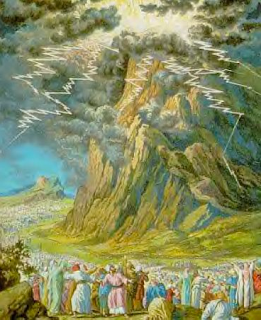TO CHEW ON: "And Elijah came to all the people and said, 'How long will you falter between two opinions? If the Lord is God follow Him; but if Baal, follow him.' But the people answered him not a word." 1 Kings 18:21
After three long years of rain, Elijah was determined to make its return as dramatic an event as he could. He challenged the 400 prophets of Baal to a prayer duel on Mount Carmel. The citizens came in droves to observe. Before they got started Elijah threw out the challenge: whichever god would answer the prepared sacrifice by sending fire would be the one worthy of worship.
We know the story—how the Baal prophets carried on all day, beseeching, dancing, even cutting themselves. All for nothing. And then, how Elijah made the task even harder by dousing his offering with water. (He had his nerve—or maybe it was his faith in action— using 12 pots of such precious stuff in this way!)
We can learn a lot from Elijah about faith and prayer as we watch him.
1. All or nothing: Elijah made the stakes clear. Either God would answer and prove Himself real or He wouldn't and show Himself a sham (1 Kings 18: 21, 24). There was no third option. Elijah gave himself no way to save face should God not answer.
2. God's representative: Elijah made sure the people knew Who was behind the last three years of misery and that he had been a mere spokesman for God. He told them the purpose behind the exercise: to turn them back to God (1 Kings 18: 36-37). Thus when God did send fire, the people worshiped Him, not Elijah (1 Kings 18: 38-39).
3. Finish the job: Elijah completed the unsavoury task of destroying the Baal prophets (1 Kings 18:40).
4. Unwavering faith: Elijah's faith was so certain, he spoke to Ahab as if the rain could start falling any moment even though there wasn't a cloud in the sky (1 Kings 18:41).
5. Humble prayer: Elijah "bowed down on the ground and put his face between his knees" (1 Kings 18:42).
6. Persistent prayer: Do you suppose Elijah felt a niggle of doubt when God didn't answer after his first prayer, then his second, his third… We don't know how much time passed between when Elijah started praying and the clouds appeared (1 Kings 18:43-44). Perhaps several hours. At least enough for Ahab to have a decent picnic.
7. Supernatural ending: As if the whole fire-throwing, rain-sending demonstration wasn't spectacular enough, God gave Elijah strength at the end of this grueling day to outrun Ahab's horses. He beat the king to the Jezreel gate.
One thing seems clear from all this: Elijah had a mighty tight and intimate relationship with God to enable him to act with such confidence. It brings to mind the verse: "…the people who know their God shall be strong and carry out great exploits" Daniel 11:32.
PRAYER: Dear God, please help me to know You better. I want to be a person to whom You entrust "exploits." Amen.
MORE: Twila Paris sings "Days of Elijah"
The Holy Bible, New King James Version Copyright © 1982 by Thomas Nelson, Inc. - Used with permission.















